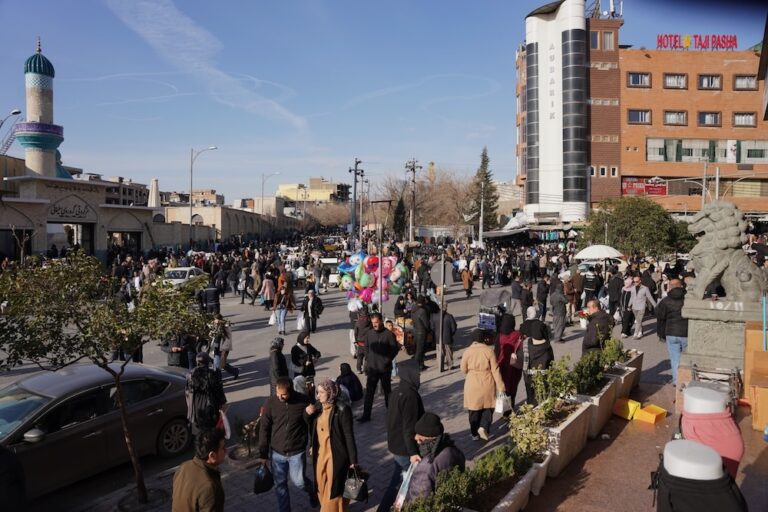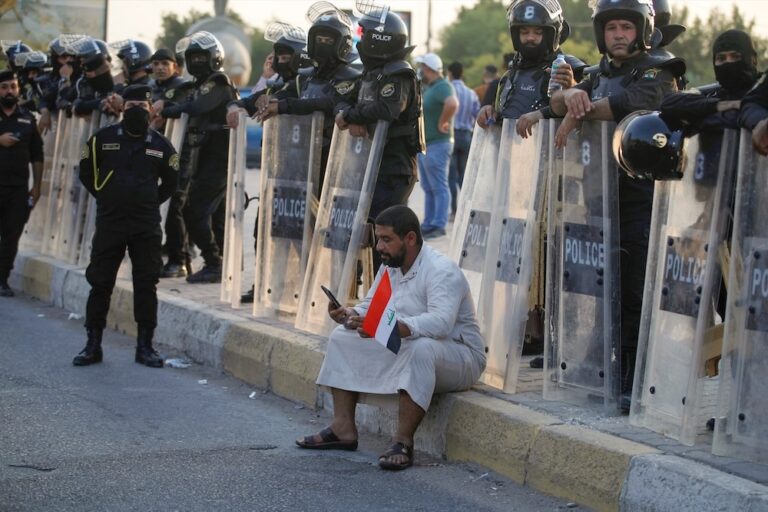The assault underscores the extreme difficulties encountered by journalists working in Iraqi Kurdistan today and the risks they face, according to a colleague of Nabaz Goran.
(RSF/IFEX) – Reporters Without Borders has called for police to do their utmost to find those responsible for a “cowardly” physical attack on leading Iraqi Kurdish investigative journalist Nabaz Goran, who has just left Erbil, capital of Iraqi Kurdistan, to seek refugee in Sulaymaniyah to the east.
The 32-year-old editor of the independent Kurdish-language bi-monthly “Jihan” (“World”) was set upon by unknown assailants and brutally battered about the face and head as he was leaving his office in the Iskan district of the Erbil, on 29 October.
“I had just come out of the office, when three men unknown to me approached me and asked me if I was Nabaz Goran. I replied that I was and they then attacked me. One of them was armed with a blunt metal object which he used to hit me on the head and face while the two others rained punches on me. They did not stop insulting my mother and my sisters,” he told Reporters Without Borders, speaking with difficulty because of pain from his injuries.
Goran believed his attackers to be from the Kurdish Democratic Party (KDP). He made a formal complaint to the police, but told RSF, “I am not under any illusions, the police are in the pocket of the KDP,” adding that he never wanted to see the city again.
“Nabaz Goran is one of the most prominent investigative journalists in Iraqi Kurdistan. This assault on him demonstrates the huge difficulties journalists like him have in doing their job in a region mired in heightened political tension between the KDP and the Patriotic Union of Kurdistan (PUK) ahead of legislative elections,” RSF said. “Police should do everything possible to identify the assailants and those who sent them to carry out this cowardly assault.”
Goran said he had no doubts about the identity of his assailants or their motives. “The KDP, headed by Massud Barzani, is clearly behind this attack. The reasons are also very clear: I am an independent newspaper that criticises parties and politicians and I do not hesitate to reveal corruption cases. And that is what they cannot stand.”
“In this city, nobody could have done what they did without definite support from the authorities (. . .) I live in a region where politicians do not understand democracy or the need for free media,” the very distressed journalist said.
The incident marks the second assault on Goran; he has also been the target of a score of legal actions, the most recent launched by Chnar Saad Abdulla, minister of Martyrs.
Journalist colleagues have all strongly condemned the attack. Ahmed Mirra, managing editor of “Leven”, the principle Kurdish language publication, told the daily “Ach-Charq al-Awsat” that the assault underscored the extreme difficulties encountered by journalists working in Iraqi Kurdistan today and the risks they run. “The aim is to silence a free press that challenges the authorities on a daily basis.”
He referred to the ultimate price paid by his colleagues in Iraqi Kurdistan who have been murdered over the past few years in political score-settling, including Soran Mama Hama, who was killed in Kirkuk in July 2008. He also pointed to a complaint laid against his paper by the province’s governor, Massud Barzani, after it carried an article revealing the governor’s salary and other privileges. Distribution was halted of issue number 94 of the paper.
In Iraq, there has been an upsurge in complaints against newspapers in recent months. Iraqi members of Parliament on 8 November lodged a complaint against the daily “Al-Mada” over an article published the previous day, written by Ward Badr As-Salam and headlined: “Parliamentarians less than zero,” in which the journalist criticised the privileges enjoyed by the elected officials.
“These proceedings are very worrying, since they demonstrate an inability to tolerate any criticism. We urge the members of Parliament to withdraw their suit,” said RSF. The organisation sent a letter to this effect on 10 November to the speaker of the House of Representatives.


